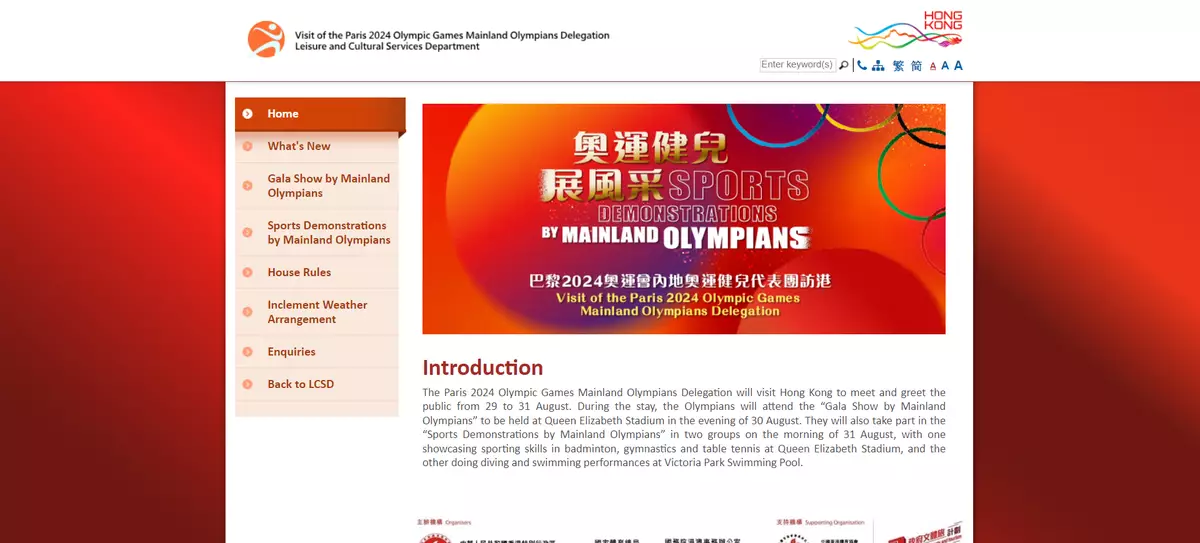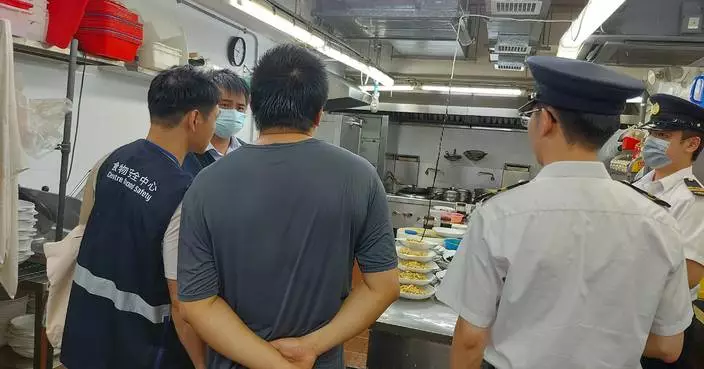2024 Paris Olympic Games Mainland Olympians delegation gala show and sports demonstrations to be held this week
The delegation of 2024 Paris Olympic Games Mainland Olympians will attend the Mainland Olympians Gala Show on August 30 (Friday) and give two sports demonstrations on the morning of August 31 (Saturday). A Leisure and Cultural Services Department (LCSD) spokesman today (August 27) reminded members of the public who have purchased tickets for the above events to present their tickets and proof of identity for admission to the venues. Details of the events are as follows:
Mainland Olympians Gala Show
Date: August 30 (Friday)
Time: 8pm to 9.30pm
Venue: Queen Elizabeth Stadium, 18 Oi Kwan Road, Wan Chai
Badminton, gymnastics and table tennis demonstrations
Date: August 31 (Saturday)
Time: 9.30am to 11.30am
Venue: Queen Elizabeth Stadium, 18 Oi Kwan Road, Wan Chai
Diving and swimming demonstrations
Date: August 31 (Saturday)
Time: 9.30am to 11.30am
Venue: Victoria Park Swimming Pool, 1 Hing Fat Street, Causeway Bay
There will be no ticket collection service at the venues on the event day. Ticket holders must collect their tickets at the URBTIX outlets or from the self-service ticketing kiosks elsewhere on or before August 30. For details on the locations of the outlets and kiosks, please visit www.urbtix.hk.
An LCSD spokesman reminded the public that as it will take time to verify personal particulars under the real-name registration arrangement and all persons will need to undergo security checks before entering the venues, the waiting time for attendees to enter the relevant venues may be lengthened. The venues will open around 75 minutes before each show starts. To avoid missing any of the events, the LCSD suggests that members of the public arrive early.
Real-name ticketing is required for ticket purchases. The full English name of each ticket holder will be printed on each ticket. Each ticket holder must present a proof of identity with photo that matches the name on the ticket for verification upon entry; failure to do so will result in denied admission and no refunds. Ticket holders may not make unauthorised amendments to the information as printed on the ticket or transfer the ticket for another's use. Audience members, after entry, are advised to retain their tickets for prize quiz and ticket inspection purposes.
To ensure public safety and order, audience members should observe the house rules, follow the instructions of on-site staff, and refrain from bringing prohibited items into the venues, or else they will be denied entry or be removed from the venues. The relevant house rules have been uploaded to the LCSD's designated website at www.lcsd.gov.hk/en/paris2024/rules.html.
The latest information will be announced on the dedicated website (www.lcsd.gov.hk/en/paris2024/index.html).
CHP appeals for heightened vigilance against invasive Group B Streptococcus
The Centre for Health Protection (CHP) of the Department of Health today (September 13) appealed to members of the public for heightened vigilance against invasive Group B Streptococcus and in particular, urged them to pay attention when touching or handling raw freshwater fish and should wear gloves, as well as not to consume undercooked freshwater fish.
Hong Kong has recorded in 2021 summer (between September and October) a cluster of more than 50 cases of Group B Streptococcus, belonged to serotype III sequence type 283 (ST283). The then investigation found that the infections were associated with contact of raw freshwater fish or consumption of undercooked freshwater fish. The CHP subsequently enhanced surveillance on the relevant cases with the Hospital Authority (HA). The recent surveillance data revealed an upward trend in the number of in-patients tested positive for invasive Group B Streptococcus during last month and September 11. The CHP immediately conducted further laboratory analysis of the cases in collaboration with the HA and the preliminary result showed that 27 of the cases were ST283. The CHP's analysis of some of the samples is still in progress and it cannot rule out that the number of cases will further increase.
The CHP's epidemiological investigations showed that the 27 patients with ST283 infections involved ten males and 17 females, aged between 53 and 88 (median: 70), residing in 18 districts throughout the territory, with no district clustering identified. Among them, 20 patients have underlying illness. The patients mainly presented with sepsis (15 patients), joint abscess (nine patients), meningitis (two patients) and urinary tract infection (one patient). The HA's information showed that among the 27 patients, five have been discharged, 17 hospitalised patients are in stable condition, three in serious condition and the other two passed away. The CHP is obtaining further information on the cause of death from HA.
The CHP also conducted an in-depth investigation on the exposure history of individual patients prior to the onset of the disease in order to identify the possible sources of infection. It was found that about 90 per cent of the patients had contact with or handled raw freshwater fish, prior to the onset of their disease. Seven of them reported that they had wounds on their hands when handling raw freshwater fish, but no infected person reported that they had consumed freshwater fish sashimi. Based on the above information, the CHP considered that the cause of infection was related to the handling of or contact with raw freshwater fish (especially with wound on the hands).
In addition, investigations revealed that 19 patients had been to freshwater fish stalls in markets and contacted freshwater fish, which involved 14 markets located in different districts. The personnel of the CHP had inspected markets where some of the patients had visited and wholesale fish markets supplying live fish to conduct epidemiological investigations. A total of 71 relevant workers have been monitored and no symptomatic worker found. The CHP has provided health education to the workers and will continue to monitor health conditions of workers of other fish stalls. During the investigations, it was identified that the ST283 isolates of environmental and fish samples collected from a retail freshwater fish stall inside the Shek Wu Hui Market is identical to those found in some patients. For prudence's sake, the Food and Environmental Hygiene Department (FEHD) has arranged thorough cleansing and disinfection for all freshwater fish stalls inside Shek Wu Hui Market. The investigations of the CHP are ongoing.
The CHP, the FEHD and the Agriculture, Fisheries and Conservation Department (AFCD) held a joint meeting today to review the relevant situation. The FEHD's personnel will inspect all fish stalls, licensed Fresh Provision Shops and Permitted Premises selling freshwater fishin Hong Kong, provide education on hygiene to relevant workers and request them to strengthen cleaning and disinfection work at the premises. The FEHD conducts thorough cleaning at each public market every day and will pay special attention to the hygiene condition in the vicinity of freshwater fish stalls in the markets. Separately, the AFCD confirmed no abnormality has been observed regarding freshwater fish in wholesale fish markets and will continue to monitor the condition of live fish.
"Literature reported that ST283 exists in freshwater fish, especially in Southeast Asia countries, and with seasonal pattern. Association between invasive Group B Streptococcal infection of ST283 and consumption of raw freshwater fish was also reported in overseas literature," a spokesman for the CHP said.
"Members of the public shall wear gloves when touching or handling raw freshwater fish. If symptoms such as inflamed wound and fever develop, they should seek medical attention promptly. Meanwhile, the public should refrain from consuming undercooked freshwater fish," a spokesman for the CHP reminded.
The CHP will issue a letter to doctors to enhance their alertness for Group B Streptococcus infection cases. The CHP will continue to provide advice to members of the public through different channels to minimise the infection risk and work together with relevant departments to enhance publicity, especially health education related to wound care and consumption of freshwater fish.
A spokesman for the FEHD said that in order to protect public health, freshwater fish sashimi is a prohibited food item under the Food Business Regulation (Cap. 132X) in Hong Kong.
To prevent Group B Streptococcus (ST283) infection, members of the public are reminded to maintain personal, food and environmental hygiene and should keep their hands clean and practice good wound care at all times, especially:
To minimise the infection risks, workers of aquatic products or restaurants must wear gloves when handling aquatic products and avoid direct contact with aquatic products or dirty water with bare hands;
When buying aquatic products, the public must avoid direct contact with the aquatic products or use any towel provided by the stalls. They should wash hands with liquid soap and water as soon as possible if having contact with aquatic products which are not fully cooked. When handling aquatic products at home, the public should also wear gloves and wash hands thoroughly afterwards;
Members of the public must not eat any freshwater fish sashimi, raw or undercooked freshwater aquatic products. When consuming hot pot food or congee items which consist of aquatic products, they should ensure that the food is thoroughly cooked in which the centre of the food should reach a temperature of at least 75 degrees Celsius so as to destroy pathogen; and
People must not touch aquatic products directly whenever there is a wound on hands. If a wound is sustained during handling aquatic products, the wound must be cleaned immediately and properly covered with waterproof adhesive dressings. Individuals should seek medical advice promptly when wound infection is found.
The public may visit the CHP's Invasive Group B Streptococcus Infection associated with Sequence Type 283 (ST283) page for more information.

Source: AI-generated images










